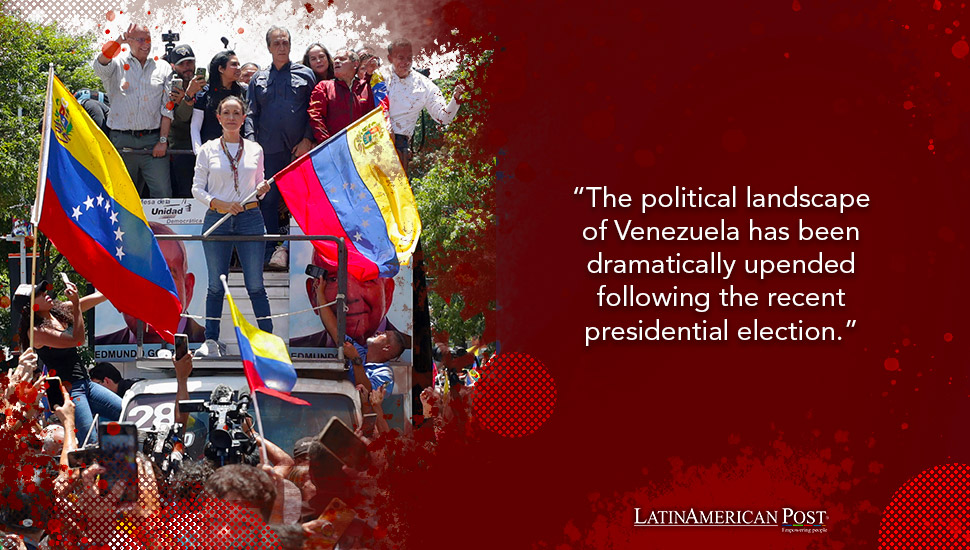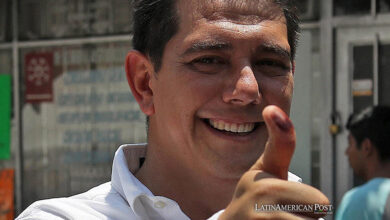Venezuelan Opposition Likely Secured Overwhelming 80% of the Vote

The recent Venezuelan presidential election has highlighted significant discrepancies. Opposition leader Maria Corina Machado announced that her coalition secured over 80% of the vote tally sheets, a significant victory that challenges the official results and could potentially lead to a major shift in the political landscape.
The political landscape of Venezuela has been dramatically upended following the recent presidential election. Just 24 hours after the polls closed, opposition leader Maria Corina Machado declared that her coalition had secured more than two-thirds of the vote tally sheets from polling centers nationwide, indicating a decisive loss for President Nicolás Maduro in his bid for re-election. This announcement has sparked widespread controversy and highlighted severe irregularities in the election process.
Months of meticulous preparation and the involvement of thousands of volunteers, each demonstrating unwavering commitment, were crucial in the opposition’s efforts to safeguard the integrity of the electoral process. The opposition coalition knew securing the actas, or vote tally sheets, was essential to challenging the anticipated unfavorable official results. These tally sheets, resembling lengthy shopping receipts, are considered the definitive proof of election outcomes in Venezuela.
Tens of thousands of volunteers participated in training workshops nationwide to ensure they could obtain as many acts as possible. They learned their legal rights to be present inside polling centers on Election Day, stationed near voting machines from before the polls opened until the results were transmitted to the National Electoral Council in Caracas. This organizational discipline was critical, given the ruling party’s tight control over the voting system and the presence of soldiers, civilian militia, police, and party loyalists at polling places.
Despite officials’ attempts to block opposition volunteers from entering voting centers, many persisted, armed with their knowledge of the law and polling station manuals. Machado praised these volunteers as “the heroes of this process,” noting their determination to stay inside voting centers until well after polls closed to ensure they obtained the necessary tally sheets.
Technological Strategies and Real-time Reporting
The volunteers were also trained to use a custom-made app to report irregularities such as opening delays or power outages and scan a QR code on each tally sheet. This technology allowed campaign workers to access voting results immediately, providing a real-time overview of the election outcomes. The acts, often nicknamed “chorizo” due to their length, show vote totals broken down by candidate, a QR code, and the signatures of party representatives, an electoral employee, and poll workers.
In previous elections, infighting and disorganization had hampered the opposition’s ability to secure and protect these tallies. However, this time, the opposition obtained more than 70% of the tally sheets, which eventually grew to over 80%. This significant achievement provided the opposition with a robust foundation to challenge the official results reported by the National Electoral Council.
The National Electoral Council’s official results reported that Maduro received 5.1 million votes, while Edmundo González, representing the Unitary Platform opposition coalition, earned over 4.4 million. However, updated figures from the council later claimed that Maduro had 6.4 million votes compared to González’sGonzález’s 5.3 million. These discrepancies raised severe concerns about the transparency and accuracy of the electoral process.
Machado and González, supported by the scanned tally sheets, presented a starkly different picture. Their records showed González received roughly 6.2 million votes, significantly more than Maduro’s 2.7 million. They also uploaded the scanned tally sheets to a searchable website, allowing Venezuelans to verify the results using their government identification numbers. These findings could potentially reshape the future of Venezuelan politics, challenging the current government’s narrative and paving the way for a more transparent and accountable electoral process.
The government quickly countered, claiming that the electoral council’s website had been hacked and insisting that Maduro was the indisputable winner. National Assembly President Jorge Rodriguez labeled the opposition as “violent fascists” and called for the arrest of Machado and González. Despite these accusations, the opposition’s findings have continued to gain traction domestically and internationally.
International and Domestic Repercussions
The opposition’s announcement and the subsequent government response have sparked widespread criticism and condemnation. International observers, who were unable to verify the results, expressed serious concerns about the integrity of the election, amplifying the global impact of the Venezuelan election. Even regional allies of Maduro, such as Brazilian President Luiz Inácio Lula da Silva and Colombian President Gustavo Petro, urged the Venezuelan government to publish the complete vote tallies to ensure transparency.
The U.S. government also weighed in, congratulating González on his apparent victory. U.S. Secretary of State Antony Blinken issued a statement highlighting the flawed vote processing and the announcement of results by the Maduro-controlled National Electoral Council, which he said did not represent the will of the Venezuelan people. This international pressure has added to the growing demands for a thorough and transparent review of the election process.
The current situation in Venezuela is fraught with challenges but also presents opportunities for change. The opposition’s ability to mobilize and organize effectively demonstrates a significant shift in the country’s political dynamics. This grassroots effort, supported by technology and real-time reporting, has given the opposition a powerful tool to challenge the status quo and demand greater transparency and accountability in future elections.
However, the road ahead is not without obstacles. The government’s response, including calls for the arrest of opposition leaders and accusations of hacking, indicates a potential escalation of political repression. The international community’s role in supporting a peaceful and democratic resolution will be crucial in the coming weeks and months.
The opposition’s likelihood of securing over 80% of the vote tally sheets is a testament to the determination and resilience of Venezuelans committed to democratic principles and electoral integrity. This achievement, while significant, is just the beginning of a broader struggle for political reform and social justice in Venezuela.
A Turning Point for Venezuela
The recent presidential election in Venezuela has revealed deep-seated issues within the country’s electoral system. The opposition’s ability to secure and present compelling evidence of its victory underscores the urgent need for comprehensive electoral reforms and greater transparency.
The widespread participation of volunteers and the use of technology in monitoring and reporting election results have set a new standard for future elections. This grassroots movement reflects a growing demand for change and accountability, which the government can no longer ignore.
As Venezuela moves forward, the international community must continue to support efforts to ensure free and fair elections. The opposition’s findings have already prompted significant international attention and call for transparency, highlighting the critical role of global oversight in upholding democratic values.
Also read: Venezuela’s Election Fraud
The opposition’s likelihood of securing over 80% of the vote tally sheets marks a pivotal moment in Venezuela’s Venezuelan political landscape. It represents a clear mandate for change and a decisive rejection of the current administration’sadministration’s policies. The path to a more democratic and transparent Venezuela will be challenging, but the resolve and determination of the Venezuelan people offer hope for a brighter future.





